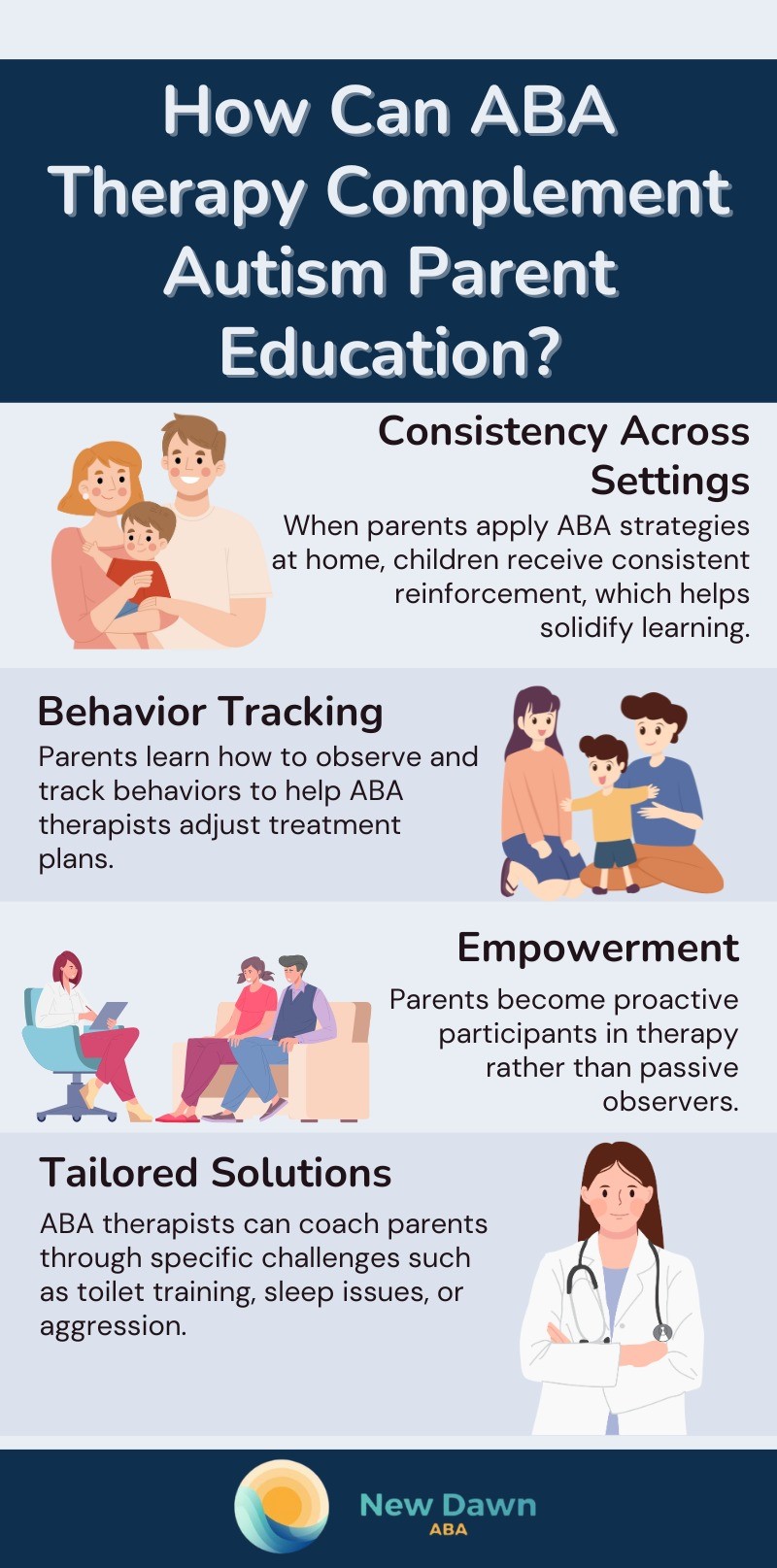Key Points:
- Parent education for autism empowers families with practical tools, communication strategies, and emotional support to better assist their child’s development.
- A wide variety of free and professional resources, training programs, and community networks are available for parents.
- Parent involvement, paired with expert guidance like ABA therapy, significantly improves outcomes for children with autism.
Every autism diagnosis comes with a whirlwind of questions, emotions, and decisions for parents. While each child’s journey is unique, one thing remains consistent: parents play a crucial role in shaping their child’s developmental path. That’s why parent education for autism is more than just a resource—it’s a lifeline.
Is Parent Education Necessary For Autism Support?
Yes, parent education is a vital part of supporting a child with autism. Research and clinical practice both confirm that well-informed parents can significantly improve their child’s outcomes—socially, emotionally, and behaviorally.
Autism is a developmental condition that affects communication, social interaction, and behavior. While early intervention therapies like ABA (Applied Behavior Analysis) are essential, their effectiveness increases when parents understand how to support these strategies at home. That’s what parent education on autism aims to do: provide practical tools, behavioral insights, and emotional support that empower parents to become confident advocates and caregivers.

What Does Parent Education for Autism Include?
Parent education isn’t a one-size-fits-all program. It comes in many forms and can be tailored to fit a family’s needs. These programs typically cover several key areas to equip parents for daily life with their child.
Understanding Autism Spectrum Disorder (ASD)
The first step is building a foundational knowledge of what autism is, how it presents, and what it means for long-term development. Understanding your child’s unique profile of strengths and challenges makes it easier to make informed decisions about therapy, schooling, and daily routines.
Behavior Management Strategies
Many parent education programs focus on teaching evidence-based techniques to handle challenging behaviors. Parents learn how to:
- Prevent tantrums and meltdowns through proactive strategies
- Use positive reinforcement to encourage desired behaviors
- Reduce problem behaviors using clear, consistent responses
Communication Support
Whether a child is verbal or non-verbal, communication support is key. Parents are taught how to foster language development, use visual aids or alternative communication systems (like PECS), and improve two-way interactions.
Daily Life and Routines
Simple things like getting dressed, brushing teeth, or going to the grocery store can be harder for children with autism. Parent education helps families establish structured routines, improve transitions, and support independence.
Emotional Support for Parents
Caring for a child with autism can be emotionally taxing. Many programs also include mental health resources, peer support groups, and stress-reduction techniques to help parents cope and thrive.
Where Can Parents Find Education and Support?
Thankfully, families today have more access to autism-related resources than ever before. Depending on your needs, you can explore these types of parent education autism resources.
1. Professional Programs and Training Workshops
Many ABA providers, therapists, and autism centers offer formal parent training sessions. These are often based on behavioral science and provide parents with structured learning modules.
Some popular programs include:
- The RUBI Parent Training Program: A behavior-focused series for parents of children with ASD.
- The Early Start Denver Model (ESDM): Designed for young children, it includes intensive parent involvement.
- PEERS® for Parents: Focused on improving social skills through parent-coaching.
2. Online Resources and E-Learning
For busy families or those in remote areas, online learning is a flexible and practical solution. Reputable organizations provide webinars, videos, downloadable guides, and e-learning courses.
Popular sources include:
- Autism Speaks
- The Autism Navigator
- The National Autism Association
- Centers for Disease Control and Prevention (CDC) autism page
3. Books and Guides
There are excellent parent-focused books that offer insight and tools in a digestible format. Look for authors who are professionals in the field or parents of children with autism themselves. Some recommended titles include:
- “The Out-of-Sync Child” by Carol Stock Kranowitz
- “Uniquely Human” by Dr. Barry Prizant
- “Ten Things Every Child with Autism Wishes You Knew” by Ellen Notbohm
4. Support Groups and Peer Communities
Sometimes, the most valuable advice comes from someone who’s walked a similar path. Parent-led support groups offer a safe space to share experiences, ask questions, and gain encouragement.
These can be local meetups, Facebook groups, or national communities like:
- The Autism Society of America
- Parent to Parent USA
- MyAutismTeam
How Can ABA Therapy Complement Autism Parent Education?
Applied Behavior Analysis (ABA) is one of the most widely recognized and evidence-based treatments for autism. But ABA isn’t just about the child—it also involves the family. When parents are trained to understand and implement ABA strategies at home, the impact multiplies.
Here’s how ABA and parent education autism programs work together:

ABA therapy often includes a parent training component, which means families receive hands-on coaching on techniques that actually work with their child.
What Should Parents Look For In A Parent Education Program?
Every family is different, and the right program will depend on your child’s age, diagnosis, and specific needs. When evaluating parent education autism programs, consider the following:
- Is the program evidence-based and backed by research?
- Does it include a hands-on or practical component, not just theory?
- Is there support available beyond the training (e.g., follow-ups, access to professionals)?
- Does the program respect and support neurodiversity and positive parenting values?
- Is the program accessible (cost, language, location, etc.)?
Don’t hesitate to ask questions and request feedback from other parents or professionals before committing.
Build Confidence, Not Just Knowledge, With Professional Guidance
Raising a child with autism is a journey filled with learning, adaptation, and growth—for the whole family. Parent education isn’t just about reading books or attending workshops—it’s about building confidence and gaining the tools to help your child flourish.
You don’t have to figure it all out alone. Partnering with professionals who understand autism and behavior support can make a world of difference.
Take the Next Step With ABA Therapy Support
At New Dawn ABA, we believe that empowered parents create empowered children. That’s why our ABA services are designed to include families every step of the way. If you're looking to understand and support your child with autism more effectively, our expert team is here to guide you through customized behavior strategies and parent training sessions.
We offer ABA therapy in Colorado and Missouri, focusing solely on high-quality, individualized care for children with autism. Whether you're new to autism or seeking additional tools, ABA therapy can help your child grow in communication, behavior, and daily living skills—while giving you the knowledge and confidence to support them every day.
Contact us today to discover how parent education and ABA therapy can make a lasting difference for your family. You're not alone—and your support network starts here.
Recent articles

At New Dawn ABA, we believe in brighter beginnings. Our team partners with families to build skills that matter—turning daily moments into meaningful progress and long-term independence.

.svg)
.svg)
.svg)
Quick Links
HomeAbout UsServicesResourcesCareersContact UsPrivacy PolicyOur Locations
MissouriColoradoKansasOklahoma (Coming Soon)Contact Information
.png)
720-784-4944
.png)
720-784-4945
.png)
info@newdawnaba.com
Copyright © 2025 New Dawn ABA - All Rights Reserved.




